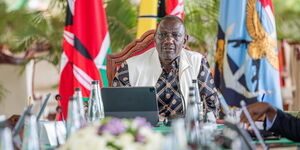Jeffsky Poincy a Haitian Policy Specialist on Tuesday raised concerns about the Multinational Security Support (MSS) mission being led by Kenyan police officers.
Poincy who served as a Public Investment Analyst in the Ministry of Youth and as an Economic Development Advisor to Haiti's Minister for the Ministry of Tourism argued that the mission was filled with undisclosed nitigrities that failed to win the trust of the people.
He explained that there was ambiguity on the mission's objectives and operational countries. He revealed that the Presidential Security Council and local law enforcement lack enough information on the mission.
"Although Haitians expect a muscular intervention to directly address gang violence, according to the memorandum signed by the Haitian and Kenyan authorities, the latter envisions the MSS mission playing a more passive role, focusing on basic infrastructure security," he stated.
Additionally, the official also raised concerns about inequality between the Kenya police and their Haitian counterparts. He noted that the foreigners were prioritised compared to the Haitian Police Service.
He explained that this was information on pay, benefits and evacuation in case the mission did not go as planned.
"MSS Mission officers will benefit from guaranteeing medical evacuation corridors to the Dominican Republic in the event of harm, in stark contrast to Haitian officers, who have no such assurances despite facing greater risks in the fight against criminal gangs," he lamented.
Poincy also highlighted that the Haitian officers were only getting Ksh26,500 monthly compared to a Kenyan officer's Ksh199,000 exclusive of allowances.
The official emphasised that this difference would further destroy the morale of the Haitian officers who will be left to offer security when the mission is concluded.
Another challenge exposed by the official was the lack of clear accountability mechanisms in case Kenya police officers violate human rights during the mission. He noted that this was a concern raised by civil rights groups.
"The Kenyan forces leading the mission have a documented history of human rights abuses," he added.
To resolve the mentioned challenges, Poincy suggested that investments should be directed to Haitian institutions for long-term benefits, establish accountability mechanisms, disrupt the flow of weapons and illicit goods that fuel gang activity and also destabilise the connections between gangs and politicians.












